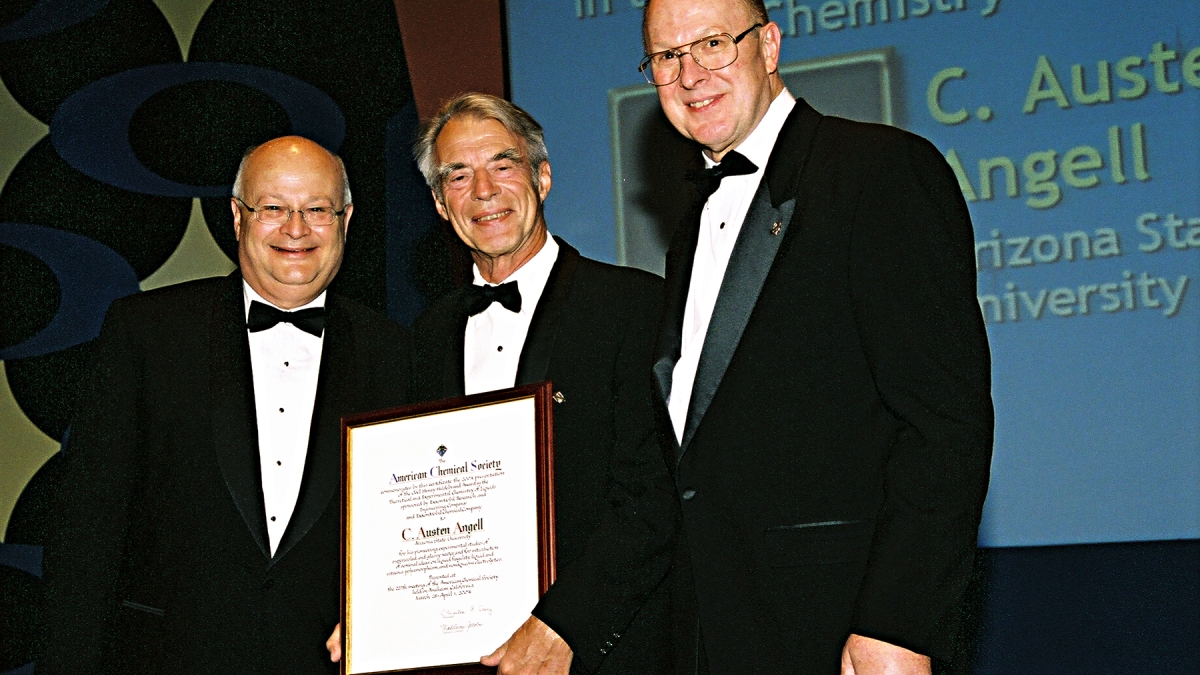School of Molecular Sciences celebrates the life and science of C. Austen Angell

Austen Angell (center) receiving the 2003 American Chemical Society Award.
On March 3, the Arizona State University School of Molecular Sciences held a special event to remember and celebrate the life and science of longtime faculty member and colleague (Charles) Austen Angell, who died in March 2021.
Due to COVID-19 restrictions, the event was postponed until this year, when hundreds of colleagues, family and friends from 14 different countries were able to come together at ASU and online to honor Angell’s life and legacy.
Angell is considered one of the most important chemists in the history of ASU, and one whose work contributed significantly to the reputation of the School of Molecular Sciences.
In the scientific presentations he gave at academic institutions and conferences around the world, Angell always took the opportunity to bring attention to ASU as a place for excellence in research in chemistry and biochemistry.
He published over 700 scientific papers over a wide range of scientific areas, from the physical chemistry of materials, to energy science, geochemistry and biochemistry. His papers have been cited over 70,000 times, and Angell’s h-index, a measure of the impact of his research articles, is 117, putting him among the top chemists in the world.
Angell pioneered discoveries in glasses and liquids, including the properties of water under unusual and extreme experimental conditions, as well performing pioneering research in fuel-cell and battery technology. He was the recipient of numerous international awards and honors, and was a much-respected and sought-after collaborator and colleague.
Tributes to Angell came in from around the world and across ASU.
“Austen was truly one of a kind: Incredibly smart, kind, funny and generous,” noted School of Moleculary Sciences Professor Marcia Levitus. “Having Austen in the room always guaranteed an interesting conversation regardless of the topic or setting. I consider myself incredibly lucky to have been his colleague all these years, and I’m grateful for his mentoring and friendship,”
Omar Yagi of the University of California, Berkeley, said, “I don’t know how many countless occasions I have enjoyed discussing science with Austen. He was always a gentleman, an intellect and a scholar.”
“I remember my time as a postdoc at ASU, visits to Arizona and the friendship with all our former colleagues at ASU with great joy,” said Tor Grande from the Norwegian University for Science and Technology. “This would never happen without Austen, and he has been one of my most important mentors in my career.
Peter Harrowell of the University of Sidney recalled, “If I was to remember one thing about Austen, it is his generosity in not only sharing his enormous enthusiasm for research itself, but his genuine enthusiasm for the people doing the research — the very antithesis of the stereotype of the successful scientist clutching all credit to themselves.”
“Thank you, Austen, for your continuous stimulation to my research,” said Masayoshi Watanabe from Yokohama National University Hodogayaku. “This has encouraged me to do creative works, and will do so in the future.”
Longtime friend and colleague Pablo Debenedetti, dean for research at Princeton University, delivered remarks and, in scientific fashion, gave a talk titled "Supercooled Water, A Computational Perspective," inspired by his many collaborations with Angell.
Attendees at the event also included former collaborator Lars Pettersson, professor of physics at Stockholm University; former graduate students Pierre Lucas, professor of materials science at the University of Arizona, and Steve Martin, professor of engineering at Iowa State University; and Sina Tamaddon, a former undergraduate student and former senior vice president of applications for Apple.
Angell was remembered by all, including the School of Molecular Sciences’ own Alex Navrotsky, who shared fond memories along with Angell's three sons, Michael, Daniel and Austen Jr.
Angell was remembered not just for his scientific accomplishments, but also for his kindness and generosity. He exemplified a love for and curiosity of nature, which was expressed through his research and his ability to inspire others. Known for his ability to create and tell captivating stories, Angell was an also an avid listener who treated people with dignity and respect. He had a positive energy and joy of life that he instilled in others, whether in a classroom or while traveling around the world.
Angell’s legacy will continue in the love of his family and friends, the lives of those he touched, and the many generations of scientists he developed and encouraged.
The celebration of life in Angell’s honor can be viewed on Vimeo.
Memorials for Angell have been published by ASU News and Nature, and many more tributes to Angell are available by searching online.
More Science and technology

ASU to host 2 new 51 Pegasi b Fellows, cementing leadership in exoplanet research
Arizona State University continues its rapid rise in planetary astronomy, welcoming two new 51 Pegasi b Fellows to its exoplanet…

ASU students win big at homeland security design challenge
By Cynthia GerberArizona State University students took home five prizes — including two first-place victories — from this year’s…

Swarm science: Oral bacteria move in waves to spread and survive
Swarming behaviors appear everywhere in nature — from schools of fish darting in synchrony to locusts sweeping across landscapes…

